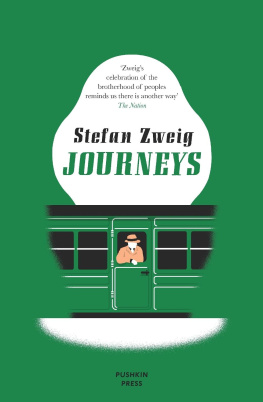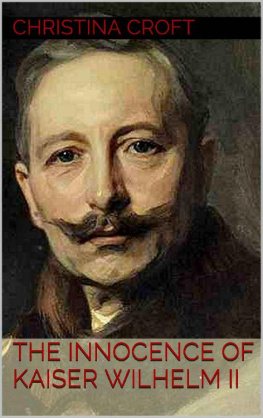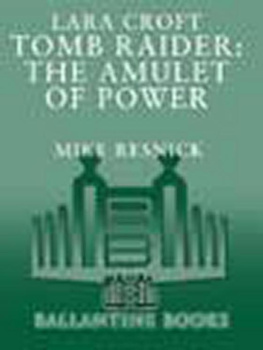THE WINTRY SEA
Rupert Croft-Cooke

This electronic edition published in 2011 by Bloomsbury Reader
Bloomsbury Reader is a division of Bloomsbury Publishing Plc, 50 Bedford Square, London WC1B 3DP
Copyright RUPERT CROFT-COOKE, 1964
The moral right of author has been asserted
All rights reserved
You may not copy, distribute, transmit, reproduce or otherwise make available this
publication (or any part of it) in any form, or by any means (including without limitation
electronic, digital, optical, mechanical, photocopying, printing, recording or otherwise),
without the prior written permission of the publisher. Any person who does any
unauthorised act in relation to this publication may be liable to criminal prosecution
and civil claims for damages
ISBN: 9781448205141
eISBN: 9781448204700
Visit www.bloomsburyreader.com to find out more about our authors and their books
You will find extracts, author interviews, author events and you can sign up for
newsletters to be the first to hear about our latest releases and special offers
1
The Rock
I have given this book its title because the words seem to fit each of the two journeys it records, journeys which, in the cant phrase of the courtroom, ran concurrently. The first was through the Mediterranean on a Yugoslav cargo boat during the coldest months of one of Europes most icy winters for a century. The second was along the coastlines of some recent fiction. If I need another reason, the words are quoted from The Schooner Hesperus which was the first piece of horror fiction I read, for it chilled me at the age of seven.
For me the essential of a holiday is that its planning should be taken out of my hands and it is not merely facetious to say that the only real holiday in my life was provided by my six years in the army, when all decisions were made for me. Here it would be the samethe route decided by the exigencies of cargo, for passengers are a very small consideration on a ship like this, and my choice of fiction made for me by the booksellers in various ports on whose stocks of Penguins I should rely.
But a real holiday it was to be, a month or two of rest after several years of the overwork inevitable to one who enjoys it. A holiday with all its trappings, late rising, change of scenery, solitude, visits to unknown places, good food and drink andas I thoughtsome light reading. If I had been going from England I should have added sunlight, but since I live in Tangier I could take my chance of this and was prepared for snow and crisp weather. All these things I hoped to find on a freighter running from Tangier to Yugoslavia and calling at a number of Italian and Sicilian ports. There would be no trains to catch, none of the fearful boredom of flying, no engagements to keep and no regrets at having missed something in the theatre or cinema, on television or radio. But a holiday also from the things I loved, the difficult but sometimes ecstatic gardening of Morocco, cooking, that most immediately rewarding of the arts, guests from England, motoring and The Times crossword. Clichs do not grow in the language without good reason and it is not for nothing that we speak of a nice change.
Besides, the trip promised well. Gibraltar, not as I usually saw it on a hurried shopping excursion from Tangier but with a few days to see friends and equip myself for the journey. Then Savona, a port north of Genoa at which ships of the Yugoslav Line rarely called, Genoa itself a city I had never seen, Naples to which I, like most of its visitors, longed to return, Catania, Venice and Rijeka, once Fiume, where I could stay as long as I wished and from which I could visit other places in Yugoslavia.
The trip into fiction promised well, too, for it would be the first I had made for ten years since I reviewed for the Sketch and had to read all too many new novels. That was a curious joba page to myself, my own choice of books at the Sketch offices, freedom to say what I liked and no editorial interference. It was not lavishly paid but the books themselves, sold to a useful functionary called a reviewers bookseller, produced a monthly benefit free of income tax, and that made it worth while. But when I look back over the hundred and fifty odd Book Pages I did in those years I seem to have worked through an uninteresting epoch for with one or two exceptions no writer of significance emerged. On the contrary, it is depressing to find how many names loudly heralded by parental publishers are heard no more, and how many then bright and established reputations have been extinguished.
One of those exceptions was Angus Wilson. When The Wrong Set, his first book, and that a collection of short stories, came out in 1949 I ventured the prediction that he had a notable future as a writer, no very remarkable piece of foresight since his qualities should have been obvious to any wakeful critic, and when Such Darling Dodos was published a year later I made the mistake of asking for something on a more ambitious scale from an author who is really an inspired miniaturist. I also reviewed a firstor was it a second?novel by Lawrence Durrell, issued by an obscure publisher in 1948 and uninvitingly called Cefalu. I thought Mr Durrell was clever, much too clever to be a good novelist or even a very good writer. Moreover I seem to have let myself go on George Orwells Nineteen Eighty-four and Oliver Onionss Arras of Youth, and kept to the fore, as well as I was able in that obscure corner of the critical world, names which were either taken for granted or forgotten elsewhere, Gerald Kersh, Jocelyn Brooke and William Sansom, Frederic Prokosch and Richard Llewellyn, who got a hostile press for a book called A Few Flowers for Shiner which I thought one of the best novels of army life I had read.
But there were no breathtaking discoveries during that time and little to console one for the grinding work, so at the end of it, when I had not once failed to send in my copy every other Monday for six years, I felt I should never want to read a new novel again, and for the rest of my life be satisfied with the books I knew and cared for, letting others perform that exhausting feat which is called keeping abreast of the time.
But rumours reached meeven in Tangier. New names emerged with a fanfare and reputations were made overnight with something called the proletarian novelan odd form of categorization, I thought. I was told, as we all are, that I must read this or that, and adjectives, in the conversation of my friends, hummed like sirens. So-and-So was terrific, So-and-So important. It was teasing and provocative and stirred the old curiosity and the old optimism which had made me open every parcel of books from the Sketch with hope. Now was the time to put it to the proof. My days at sea would be filled with novel reading and from it I might learn something of recent trends. This reading would be forced on me, for there would be nothing else to do, but it would be unprofessional and uncritical. Or so I thought.
As a young man I travelled on cargo boats because I could afford no other, but with the years I have found in them the happiest means of transport. I prefer the term tramp steamer, suggesting as it does haphazard wanderings from port to port, and one of the attractions of such a voyage is that the passenger does not know precisely where it will take him or how long it will last. Between ports may come a signal to the Captain that an extra call is to be made or even a new route followed. But a tramp steamer has other advantages over a liner, for the passenger. One is truly at sea, and not staying at a huge holiday camp, in motion over the remote irrelevant waves. One is among seamen who are the most interesting and interested beings alive, who never seem to lose their gusto or their humour and are tolerant and a little inquisitive in their attitude to landsmen, one of the few professions left in a hurried world whose marks are still distinguishable.












